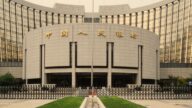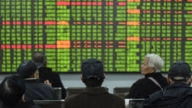【新唐人2013年07月04日讯】连日来,中国大陆出现的“钱荒”风波,热度依然不减。日前,中宣部向各地媒体和地方宣传部门下令,停止炒作“钱荒”的报导。分析指出,中国的钱荒,不再只是经济的问题而已,已经上升到政治问题。如何解决问题?中共高层进退两难。下面请随本台记者一起来看看专家的分析。
据英国《金融时报》记者发自上海的报导,中宣部上个星期已发出指示,要求报纸、电视台、地方党委宣传部,下令所属的记者停止“炒作所谓的钱荒”,同时,还要报导中国市场资金充裕的信息。
报导还说,中宣部官员定期就敏感政治议题向国家的媒体发出指引,说明避免用什么字、报导怎样定调等,但是,像这次这样对财经媒体下指令的做法,还是很罕见的。
而美国《彭博社》报导,中国银行的盈利增长,已经被外界对新借贷被用于偿还旧债的担忧蒙上阴影,中国经济急剧的放缓,可能触发破产和违约。
报导指出,中国商业银行的不良贷款已经连续六个季度攀升,这是九年来最长的上升曲线。不良贷款比一年前上升20%,在第一季度达到860亿美元。
美国“南卡罗莱纳大学”艾肯商学院教授谢田:“这个问题集中体现了中共的独裁统治和中国人民老百姓的利益尖锐对立,这样一个现实,这个问题是涉及到所有的人的,涉及到钱的问题,这个东西它想要继续掩盖也掩盖不住了,实际上上海的同业利率飙升,他们是没有办法掩盖的。”
《彭博社》的报导还说:中国工商银行的股票和它的三大国内竞争者—-中国建设银行,中国农业银行和中国银行,上个月在香港股市平均下跌12%,抹去了今年以来的涨幅。
专家预计,中国的信贷紧缩,贷款增长放缓将进一步拖累经济。而这样的担忧让一些全球投资者远离中国银行股票。
同时,美国《华尔街日报》(The Wall Street Journal)也在关注中国的“钱荒”问题。
报导说,大陆央行对银行间市场的“钱荒”袖手旁观,致使银行间利率在过去两周大幅飙升。6月24号,中国股市创出近四年来最大单日跌幅,拖累亚洲股市和大宗商品市场普遍走软。不过《华尔街日报》看到一份内部会议资料显示,央行面对信贷增长失控,已经没有别的对策了。
谢田指出,如果中共想解决问题,也可能注入流动性资金,但数额需要在几千亿到上万亿的规模,才有可能解决。但是,相对来说,也会有负面的影响。
谢田:“如果他要在提供上万亿或者更多的资金进入金融体系,实际上原来的问题就会一直加剧,直到中国资产泡沫化,基础建设失控,信贷过度,问题肯定是火上浇油, 如果不注入资金让钱荒继续下去,一定会带动金融企业、银行业大规模的破产,所以中共确实处于一种进退两难的境地。”
谢田认为,中国的“钱荒”,已经不单单只是经济问题了,“钱荒”已经变质,并上升为一个政治问题,和社会问题。
谢田:“实际上它(钱荒)揭示了中国经济里边最关键的问题,就是中国既得利益集团和中国百姓利益对立的问题,就是中国的财富从百姓手中,被窃取到,集中到权贵利益集团手中,这就是一个政治问题,它涉及到中国的政治体制的问题,中国共产党正是因为有它的专制、独裁的力量,才可以把钱掌控在自己手中,才造成现在的经济的问题。”
有分析指出,虽然中宣部下令各媒体,停止对“钱荒”的报导。但是,常言道:“纸包不住火”,那么,中国老百姓的钱,是否不再被专权者盘剥利用,我们将继续关注。
采访编辑/常春 后制/李勇
Experts: China’s Credit Crunch is a Political Problem
Recently, China’s bank “cash shortage"has continued.
The Chinese Communist Party’s (CCP) Central Propaganda
Department (CPD) had sent an order to media and local CPD.
It instructed them to stop hyping up the shortage of cash.
Analysts said that China’s credit crunch is no longer an
economic problem, but a political problem.
How can this problem be resolved?
This is the dilemma for the CCP top leaders.
Let’s take a look what the experts say.
The Financial Times (FT) reported in Shanghai that
the CPD issued orders last week.
It instructed journalists of newspapers, TV stations and
local CPD to stop “hyping up"the so called cash crunch.
Instead, they need to spread the message that
China’s markets are well stocked with money.
The FT revealed that the CPD regularly sends
guidelines to media about sensitive political subjects,
and advises which words to avoid,
and how to frame their reporting.
However, it is rare for such instructions
to be sent to Financial media.
Bloomberg reported that the growth of Chinese banks’
earnings have been overshadowed by concerns that
new lending is being used to repay older debt,
and that a sharper slowdown in the economy
may trigger bankruptcies and defaults.
The report said that bad loans at China’s commercial
lenders have already climbed for six straight quarters.
It is the longest streak in at least nine years.
Non-performing loans rose 20% from a year earlier
to end of the first quarter to $86 billion.
Xie Tian, a professor at the Aiken School of Business
at the University of South Carolina:"This problem
epitomizes a reality of sharp opposition between
the CCP’s dictatorship and the Chinese people.
This problem is related to all people and involves money.
This problem can’t be hidden any more.
In fact, the Shanghai interbank interest rates have risen,
there is no way to cover it up."
Bloomberg said: Shares of Industrial & Commercial
Bank of China and its three largest local competitors –
China Construction Bank, Agricultural Bank and Bank of
China fell by an average of 12% in Hong Kong last month.
It erased all of this year’s gains.
Experts predict that China’s credit crunch, and loan
growth slowdown will further drag down the economy.
Such concerns can push away some global investors
from Chinese bank shares.
The Wall Street Journal (WSJ) is also concerned
about China’s credit crunch.
The WSJ reported that China’s Central Bank felt that
it has no way to solve the problem of cash shortage which
has catapulted interest rates to nose-bleeding highs,
during the past two weeks.
On 24th June, Chinese stocks posted their
worst one-day loss in nearly four years.
It contributed to a broad regional decline
in equities and commodity markets.
WSJ revealed data from an internal meeting
at China’s Central Bank.
It shows that the central bank had no way to deal with
what it saw as out-of-control credit growth.
Xie Tian pointed out that if the CCP wants to solve the
problem, it may have to possibly inject liquidity.
But, the amount required would require
several hundreds of billions to several trillions
to have the possibility of resolving the problem.
However, relatively speaking, it will bring a negative effect.
Xie Tian: “If several trillions or more in funds
are injected into the financial system,
the previous problem would be intensified
until the Chinese assets’bubble burst.
The infrastructure will lose control, credit will
become excessive, the problem has certainly been stoked.
If the situation remains unfunded the money shortage
will continue without injection of funds,
it will trigger the financial industry and banks
to collapse on a large-scale.
Thus, the CCP finds itself in a dilemma."
Xie Tian believes that the cash shortage isn’t only an
economic problem, it has transformed into political and social problems.
Xie Tian:"Actually, China’s credit crunch
revealed a critical issue, that is,
the interest groups oppose the Chinese people.
That means China’s wealth was stolen from the civilians.
It gathered into the hands of privileged groups,
this is a political issue.
It relates to the problem of China’s political system.
The CCP has dictatorial power, they can control the money in
their hands, and have caused the current economic problems."
Analysts say that although the CPD instructed
media to stop with the reporting of the credit crunch,
nevertheless it cannot be covered up.
Whether the Chinese people’s money can be
exploited or not, we will see.

























